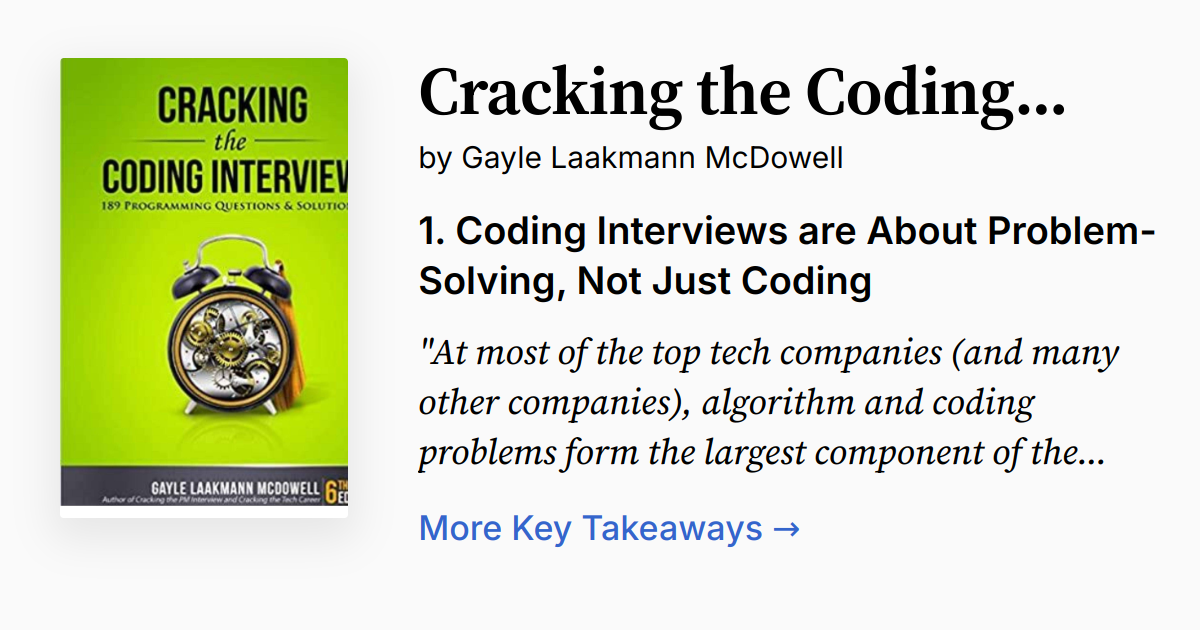Navigating a coding interview can feel like climbing a mountain, but with the right tools and preparation, you can reach the top! In this blog, we will explore the world of coding interviews, breaking down real world examples and offering clear solutions to help you succeed. Whether you are a novice coder or a seasoned programmer, understanding these concepts can significantly enhance your chances of impressing potential employers. This article focuses on the keyword cracking the coding interview, ensuring that you have the best strategies at your fingertips. Additionally, we will cover key concepts from the Cracking the Coding Interview book review and summary, helping you understand its importance in your preparation. You can also read this The Ultimate Guide to Husky Tool Boxes
What is a Coding Interview?
Understanding the Basics
A coding interview is a special kind of job interview where you get to show off your coding skills. You might be asked to solve problems using programming languages like Python, Java, or JavaScript. Think of it as a game where you have to find the best solution to a problem while being watched by someone from the company!
Why Are Coding Interviews Important?
Coding interviews help companies find the best people to work for them. They want to know if you can think on your feet and come up with smart solutions to tricky problems. By practicing coding problems, you can show employers that you are ready to tackle real-world challenges. This is especially true if you focus on the importance of data structures in Cracking the Coding Interview, as they are fundamental to many technical problems.
The Structure of a Coding Interview
The Interview Process
A coding interview usually has several parts:
- Introduction: You meet the interviewer and talk about your background and interests.
- Technical Questions: The interviewer asks you to solve coding problems. This is where the fun begins! Make sure to review the top programming questions from Cracking the Coding Interview to prepare effectively.
- Behavioral Questions: They might ask how you handle challenges or work in a team.
- Wrap-up: You can ask questions about the company and what it’s like to work there.
Time Management
Most coding interviews last about 45 minutes to an hour. It’s essential to manage your time wisely. If you get stuck on a problem, it’s okay to ask for hints or move on to the next one!
Real World Examples of Coding Problems
Now, let’s look at some real-world coding problems you might face in an interview.
Example 1: FizzBuzz
Problem: Write a program that prints the numbers from 1 to 100. But for multiples of three, print “Fizz” instead of the number, and for the multiples of five, print “Buzz.” For numbers that are multiples of both three and five, print “FizzBuzz.”
Solution:
Here’s a simple solution in Python:
for i in range(1, 101):
if i % 3 == 0 and i % 5 == 0:
print(“FizzBuzz”)
elif i % 3 == 0:
print(“Fizz”)
elif i % 5 == 0:
print(“Buzz”)
else:
print(i)
Example 2: Reverse a String
Problem: Write a function that takes a string as input and returns the string reversed.
Solution:
Here’s how you can do it in Java:
public class ReverseString {
public static String reverse(String str) {
StringBuilder reversed = new StringBuilder();
for (int i = str.length() – 1; i >= 0; i–) {
reversed.append(str.charAt(i));
}
return reversed.toString();
}
}
Example 3: Find the Largest Number in an Array
Problem: Write a function to find the largest number in a list of numbers.
Solution:
Here’s how you can solve this in JavaScript:
function findLargestNumber(arr) {
let largest = arr[0];
for (let i = 1; i < arr.length; i++) { if (arr[i] > largest) {
largest = arr[i];
}
}
return largest;
}
Tips for Cracking the Coding Interview
1. Practice Regularly
Just like any game, the more you practice, the better you get! Use online platforms like LeetCode or HackerRank to find coding problems and solutions. Additionally, consider incorporating cracking the coding interview practice problems and solutions from reputable resources.
2. Understand the Fundamentals
Make sure you have a solid understanding of data structures (like arrays and trees) and algorithms (like sorting and searching). This knowledge will help you tackle many coding challenges, and it is essential for analyzing algorithms in Cracking the Coding Interview.
3. Talk Through Your Thought Process
When you are solving a problem during the interview, make sure to explain your thinking out loud. This shows the interviewer how you approach problems and allows them to understand your thought process. You can learn a lot from user experiences with Cracking the Coding Interview to improve your communication skills.
4. Don’t Panic
If you get stuck, take a deep breath! It’s okay to ask for hints or clarify the question. Remember, the interviewer wants to see how you handle challenges.
5. Review Common Coding Patterns
Familiarize yourself with common coding patterns and strategies, such as:
- Sliding Window: Useful for problems involving subarrays or substrings.
- Two Pointers: Great for problems that involve comparing elements in a list.
- Depth-First Search and Breadth-First Search: Important for tree and graph problems.
6. Prepare Using Resources
Utilize resources like how to prepare for interviews using Cracking the Coding Interview to develop a well-rounded preparation strategy. This will give you insight into best practices for coding interview preparation with Cracking the Coding Interview.
Mock Coding Interview
To help you prepare, here’s a mock coding interview question:
Question: Merge Two Sorted Arrays
Problem: Given two sorted arrays, merge them into a single sorted array.
Solution:
You can solve this in Python like this:
def merge_sorted_arrays(arr1, arr2):
merged = []
i, j = 0, 0
while i < len(arr1) and j < len(arr2):
if arr1[i] < arr2[j]:
merged.append(arr1[i])
i += 1
else:
merged.append(arr2[j])
j += 1
# Add remaining elements
merged.extend(arr1[i:])
merged.extend(arr2[j:])
return merged
Conclusion
Cracking the coding interview is all about preparation and practice. Remember to work on your coding skills regularly and familiarize yourself with common problems and solutions. Keep a positive mindset, and don’t forget to enjoy the process! Understanding the real world application of concepts from Cracking the Coding Interview can provide valuable insights for your future career.
For more tips and resources on coding and interviews, feel free to visit UserZoneHub. You’ve got this.


